by Alex Shtaerman
In case you still don’t know, Rawkus Records is back. The acclaimed indie label that helped launch the careers of Mos Def, Talib Kweli and Pharaoh Monch is ready to make waves again in 2006 following a two year hiatus. Leading the Rawkus resurgence are The Procussions, a trio hailing from Colorado Springs intent on bringing their fresh new brand of Hip-Hop to the masses. Set to drop their Rawkus debut, 5 Sparrows For 2 Cents, on May 30th, The Procussions sit down with us to talk some Hip-Hop and explain their music and vision.
RIOTSOUND.COM: Your name, The Procussions, comes in part from Hip-Hop’s emphasis on the drum. From Hip-Hop’s earlier years until today, it seems that in more recent times, drums have actually been deemphasized somewhat. The late 80’s through the mid 90’s was the boom bap era and since then a lot of artists have gone away from that type of sound. In 2006, what is your philosophy as far as incorporating drums into your music?
MR. J. MEDEIROS: With The Procussions, the name is also emblematic of the concept and idea of an actual drum being drummed and the motion of a percussion instrument. The idea behind the name Procussions was that the root of this Hip-Hop thing is the emphasis on the drum but also it’s the actual act of the percussion. [In a sense] that’s how you act; you act like a conga or a bongo. The way you rap is like a percussion instrument; you’re hitting things and you’re interpreting rhythm in the same way that you would play a percussion instrument. So that’s an important part of the name as well.
As far as what we’re trying to do drum wise; it really helps that Stro is a well trained drummer. And I mean trained as in he plays the drums a lot a lot. With our live show we do a live drum routine right in the middle of our set. We have a drum solo where the drums are able to speak completely for themselves. Us being b-boys and with there always being b-boys in the crowd, we always let the drums dip into [all different styles] and we put a real emphasis on it and let everybody focus on it and have people dance and do whatever they want to do. So we try to give the drums their own shine. On the album if you notice after “The Storm”, which is our single, we have a track which is just a drum routine that we have going. And Stro focuses a lot man, he spends a lot of time on drums; we’re not just trying to sample those elements. Not that sampling is a bad thing but we’re just not trying to sample old loops and breakbeats that have been used over and over again, we’re trying to make original music. Sometimes we sample ourselves drumming. [Another] way we put together drum patterns is we don’t even sample actual drum sounds, we look for those type of sounds [in other places]. Stro does it with his handclaps and he manipulates those sounds so we don’t have the same snare on every song or the same kick on every song.
RIOTSOUND.COM: I really like the production on “Rain Dance”, which is the drum routine track you got on the album, as you mentioned. It feels like there’s a lot of hard acid techno influence in that. Can you talk about the making of that song, how did you approach it?
MR. J. MEDEIROS: I think us, as The Procussions, we’re extremely petrified to do anything contrived. That goes both ways; either when you go to do something and when you don’t go to do something. Either way it’s contrived. I feel like I am contriving something if I want to do something and I don’t do it for the very reason that people might not enjoy it. I think a lot of times we look at contriving attitudes as doing something for [a particular reason]. But it also works in the other way in not doing something. As far as this song is concerned, this is something that we wanted to do and we’ve been doing this routine in our shows for the last year and a half. So it was like – yo, let’s just get something good and do this. We don’t think like – yo, is that a little too techno? It’s more like – I like that, let’s put that in there and let’s do it. And [who knows], that might be our demise, that might bring us down in the future.
RIOTSOUND.COM: Or it could also be something that brings you up.
MR. J. MEDEIROS: I hope that it would bring us up because I think it says more, it has more to do with the music at that point. You’re not talking about music; you’re talking about social experiments. This Hip-Hop, as much as they try to play it off like it’s on some big rebellion stuff, it really isn’t yo. I mean, for a long time it’s been sticking to a formula, non-stop, and it’s getting worse. So should we stick to a formula or not stick to a formula? To do it just for [the sake of it] I think is wrong. But if you got something that you want to do that’s completely free, then do it. And then you can create a social movement where it’s like – I’m not even at a point where I want to talk about drum and bass right now or any other genre, I’m just at a point where I want to listen to this song.
And I think you create something in a person when they accept that. I know when I was [younger] I didn’t listen to my first non Hip-Hop song ‘till I was maybe 21. The way I felt in high school was like – yo man, why you up on that rock stuff? It’s just some high school stuff that comes into your adult life. So it’s like – wait a minute, hold on man, I’m an adult and I make my own decisions; I’m learning to know myself and I like what I like and I’m gonna do it regardless. So I think you can create new movements [by approaching it that way]. But I don’t think most people can take it all in at once. The industry moves slow and people move slow. You’re trying to move masses of people and it takes a long time because people aren’t in that place personally to be able to accept something like that. So you’re doing it in small increments and you hope that they are able to find a new freedom in themselves, not necessarily on the record, but within themselves, in order to enjoy and open themselves up to new music and new ideas.
RIOTSOUND.COM: In the song “Little People” you talk about the influence that TV has on children; and you also got another track, “For The Camera”, where you talk about some of those things in even greater detail. Can you elaborate on the message you are trying to get across?
REZ: There are so many things you see in this world. Some things are good and some things are bad. Coming from writing those songs we wanted to just give an account of what we see that’s going on. We do live in Los Angeles and for a lot purposes Los Angeles is just as bad as they think it is and [also] it’s just as good as they think it is. As far as the superficialness, you see that kind of stuff every day. You have nieces and nephews coming up to you and saying they want to be like this person or that person on TV and you start to see that the title of “hero” is starting to be equivalent to whoever happens to be on TV or in the limelight right now. And that’s taking away from the real heros, the everyday person who’s struggling and making a difference in people’s lives.
For instance, I was just visiting my family and the most powerful thing that I’ve experienced in a long time was when my nephew told me that I was his hero and that he didn’t want to be like Sponge Bob but he wanted to be like me. To hear that, it may sound a little bit cheesy and a little bit corny but that’s a powerful thing. And I think it goes in the right direction as far as people who are out there trying to make a difference in their child’s life or trying to make a difference in other people’s lives [as opposed to] just something you see on TV. All that stuff sets you up for failure. What you see on TV is completely contrived, it’s completely written. That’s why you have writers, for these situations. So we’re trying to put it out there like, let’s focus on the real people and try to be that change that you want to see.
RIOTSOUND.COM: The three of you are originally from Colorado Springs. Growing up in an environment that isn’t exactly like a stereotypical urban environment, what do you feel you bring to the table from the standpoint of experiences that you talk about in your music that may be different from those of someone who grew up in Chicago or New York or any other big city?
REZ: Colorado Springs, Colorado is in the middle of the United States and it’s a big military town. You either have parents who are in the military or all your friends’ parents are in the military. As you grow up you see that all your friends have some direct link to the military in Colorado Springs. You have people traveling all over the world; with military life and being a military brat you’re moving everywhere. You’re rarely in the same place for two years. So you have people from all over the place coming in and bringing their influences. When we grew up listening to music, the people that we met were from all different types of places with all different types of experiences. Coming from Colorado we didn’t really have a West Coast appeal or just strictly listen to East Coast music, we got to hear it all.
MR. J. MEDEIROS: There may be a stereotype of having to be from a big city in order to make [meaningful] music, but look at it this way: we live in a world where one out of every three girls is being molested or raped by someone they know before the age of eighteen. In Colorado Springs we got sexual predators that got like fourteen or fifteen victims. We got one of the highest suicide rates. It’s not about the scene and it’s not about the people. When it comes down to it, it’s not about a suburb or where you’re at or how can you speak to me because you’re from Colorado? It’s about the human spirit, that’s what’s important.
It’s about what people go through in their daily lives. When George Bush does something it affects absolutely everybody in the US, it doesn’t just affect Chicago or Colorado Springs. When the Twin Towers crumble and you got planes flying into buildings; yea, you got people that are there and they’re feeling the pain and they can experience the heat of the explosion, but everywhere else around that you also have the human spirit being dwindled down. That’s something that all people share regardless. That’s what music is, it’s the sharing of soul. So what I have to offer as a person comes out in the music. It’s not like, what does Colorado Springs have to offer Chicago? It’s what Mr. J. Medeiros has to offer another person and what that person has to offer me.
As far as personal experience, if we’re talking about doing drugs or selling drugs or that kind of stuff; no we’re not doing that. We don’t do that. So, if anything, we get to offer another side of this Hip-Hop coin where we’re not talking about drugs as far as us selling drugs or having to sell drugs in order to make money. But we got our own personal things that have also happened to everybody, things that are just as strong as anything else. A child being beat by his parents at the age of five, it doesn’t matter if he’s in Chicago. It doesn’t matter if he’s in Colorado or if he’s in Utah. It’s the same struggle and its people seeking to understand and be a better people. It’s societies, communities and families seeking to reach out and to get something better than what they have right now. If you have something good then you have something to offer someone who doesn’t have it. What I have to offer is my desire, my hope, my love and my ideals or whatever it takes to build somebody up. And that is a universal language. That has nothing to do with city or anything like that.
RIOTSOUND.COM: A lot of times when you talk to artists that are labeled as unique or different or genre defying, the artists themselves don’t exactly see it that way. I was just talking to Kool Keith the other day and I asked him how he felt with regard to critics saying that about him; and he basically said – I’m just trying to do Hip-Hop, I’m not necessarily trying to be different or similar to anybody, I’m just doing what I do and that’s as real as anyone can possibly be. So what I wanted to ask you is: rather than have other people label your music, how would you yourselves describe your sound?
MR. J. MEDEIROS: What we’re trying to do, honestly, is the same thing as what everybody else is trying to do. You’re trying to learn yourself, you’re trying to know yourself, you’re trying to get into and express the things that you feel inside. Either your personal experience or ideas and serious things that you found in books, in life or from your family and trying to put that out. What’s important for us is that we are three very different people who met on a musical level. It wasn’t even as a friendship. First we met through music and then we started to know each other later on in life.
With this album, 5 Sparrows For 2 Cents, we’ve been touring like 200 days a year. So the last two years we’ve done almost nothing but tour together, which has been crazy because we’re trying to learn ourselves as friends. I listen to a lot of metal or hardcore, I like aggressive music. I also like some crazy sensitive stuff that just makes you want to cry, like Sarah Mclachlan or whatever else I may me feeling. Then you got Stro and he’s been teaching me stuff about jazz. Just by playing it he’s teaching me because I’m starting to get involved in it. Then you got Rez and he’s a lot on the classic rock tip. So this album, for us, is really trying to mesh three souls into making one uniform sound so when it comes out you’re able to experience every single one of us individually but at the same time.
We’re making room for who we are. We’re not being contrived by a label or someone saying – hey, you guys got that jazzy sound, that would do really well in Japan; you guys should sell records in Japan. We did some jazzy stuff; that was like six years ago. We’re not trying to do that anymore, we’re trying to do what we want to do. And I think you can really hear that on “The Storm”. That’s our single and that’s one of the first songs that we did where we were like – screw this, throw away everything that people are saying about us, throw away the idea of jazz or whatever. What do we want to do? Stro, what do you want to make? Let’s tap into a sound or tap into a feeling and create that.
We work a lot with feelings. The way I write songs, like when I wrote “Little People”, it was after I was doing some reading about a woman who’s life was just crazy. I read the book and that made we want to write the song. Now, I come to Stro and I say – Stro, look at these lyrics I wrote; I wrote it to this type of rhythm. And I was like – man, I need your help, I need you to come across with this feeling. Music comes down to the emotion of the lyrics; what you’re trying to get out and how the sound provides the platform for that message that you’re trying to convey. Screw everything else, none of that stuff matters. Whether it’s jazzy or if I put a guitar in and it’s guitar rock. If the guitar fits then put it in there. So that’s what we’re doing with all our music. As the message changes and we change as people, the music is going to change.
RIOTSOUND.COM: Rawkus Records has a reputation for putting out quality authentic Hip-Hop. How do you feel about leading the Rawkus resurgence and having the first album released on Rawkus following the label’s re-launch?
REZ: We definitely feel good about it. We feel good not for the fact of their history but for the fact that they really enjoyed the album and they’re willing to push the album [the way it is]. You have some record labels that pick up something because it’s a good business move and you have some that pick up something just strictly on the love. Rawkus is picking it up on both. They’re picking it up on the fact that they see they can advance their label from this and they [also] do believe in it. The dope thing about it is that they were the ones that came to us. We already had the album done and they came to us and said – hey, we really like the album and we really like what you guys are doing on the other side of the album too. We’re completely self-contained. All the beats Stro does. Addict’s our manager who puts all the marketing ideas into effect with the help of J. And I do all the visual aspects, from the photos to the website.
So Rawkus said – you guys have the complete package, we don’t want to mess with it too much; we want to come on and we want to enhance it and take it to the next level. And we both want to benefit from this, we’re two minds that are meeting up and trying to create something better. So that’s why we’re excited. Everything else, the reputation of Rawkus Records and who was on the label, that only helps and gives you a little bit of steam but at the end of the day none of that really matters. What really matters is that the music is getting out to the people. No record deal is going to be completely beautiful, it’s always going to get a little bit ugly. But at the end of the day if you can say that it was a good decision then it’s good. So we’re completely excited, they’re completely excited and we’re about to go and take this till it can’t go anymore.
RIOTSOUND.COM: You got the album 5 Sparrows For 2 Cents dropping May 30th, what else should fans be looking out for as far as The Procussions go?
MR. J. MEDEIROS: Definitely keep up with us because we want to know people personally and we want them to know us personally as musicians. It’s important to keep up with the website www.Procussions.com because we’re always going to be putting stuff up there, especially on MySpace ( www.MySpace.com/TheProcussions ). We put up a lot of live shows and all types of different things. This is part of our lives, not just something we’re trying to market like – ok, this is our product, let’s sell it. No, this is our life. So get involved with us, we want to get involved with you.
In the future there’s going to be a lot of different things going on. Our brains are working and there’s going to be a lot of crazy collaborations. I just finished a solo album which should be out in about six months or so. Stro is going to be putting out a solo project. I can’t really say some stuff yet but just know we are working with people and you are going to see The Procussions expanding a lot. Definitely check out the tour, we love to do live shows. And also look out for another video. We got another video in the works for “Little People”.









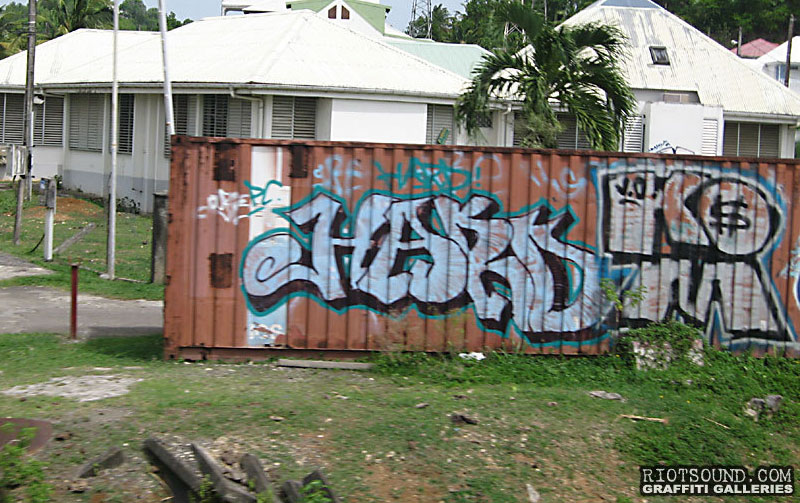

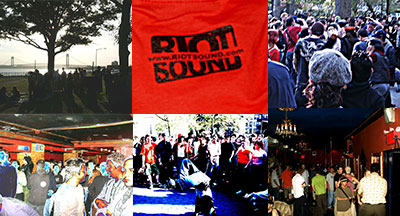
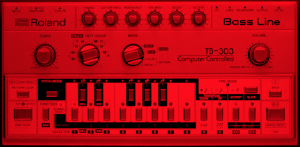













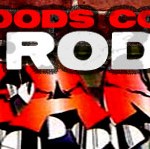




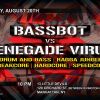

Comments